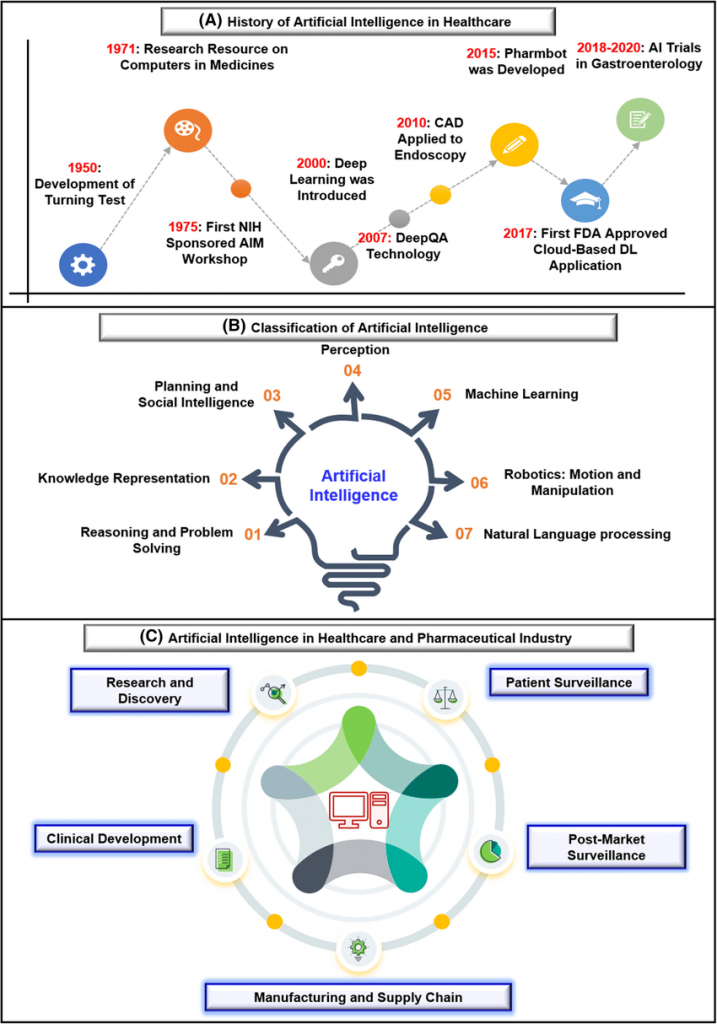Artificial Intelligence in Health Care: Transforming Diagnostics, Treatment, and Disease Management
Artificial Intelligence (AI) stands at the forefront of a healthcare revolution, offering unprecedented tools for diagnostics, treatment, and disease management. This blog post explores the dynamic role of AI in reshaping healthcare practices, underpinned by both technological innovation and ethical considerations. As we delve into AI’s capabilities, from personalized medicine to predictive analytics, the breadth of its potential to enhance patient care and streamline medical procedures becomes increasingly evident. Yet, as with any groundbreaking technology, AI’s integration into health care raises significant ethical questions, balancing the benefits of innovation against the imperatives of privacy, equity, and accountability. Join us as we navigate the transformative journey of AI in health care, highlighting its profound impacts, innovative applications, and the ethical landscape that frames its evolution.
The Evolution of AI in Health Care
The journey of AI in health care is a testament to rapid technological progress and visionary application. From the early days of simple algorithms to today’s advanced neural networks, AI has grown in sophistication, enabling significant advancements in patient care and medical research. This section traces the historical development of AI technologies, spotlighting the key innovations that have propelled AI from theoretical concept to clinical reality.
A Historical Perspective
The inception of AI in health care can be traced back to the late 20th century, where early experiments with computer-assisted diagnoses laid the groundwork for what was to come. However, it wasn’t until the advancement of machine learning algorithms and the exponential increase in computational power that AI began to significantly impact health care.
The Evolution of AI: Timeline

Read more about the history of AI in health care
Key Technologies Driving AI in Health Care
Machine Learning: Algorithms that learn from and make predictions on data, improving over time with more information.
Natural Language Processing (NLP): Enables computers to understand and interpret human language, crucial for analyzing patient records and literature.
Computer Vision: The ability for AI systems to interpret and analyze images, transforming the field of medical imaging.
Transforming Health Care
AI’s application in health care is vast and varied, encompassing everything from predictive analytics to robotic surgery. Some of the most notable advancements include:
Improved Diagnostics: AI algorithms can analyze medical images with remarkable accuracy, often detecting diseases earlier than traditional methods.
Personalized Treatment: By analyzing patient data, AI can recommend customized treatment plans that improve outcomes and reduce side effects.
Efficient Resource Allocation: Predictive analytics can help manage hospital resources, predict patient admissions, and optimize treatment schedules.
The evolution of AI in health care is an ongoing journey, with each advancement bringing us closer to a future where health care is more accessible, effective, and personalized.
AI in Diagnostics: Revolutionizing Early Detection
One of the most promising areas of AI in health care is its application in diagnostics. By harnessing the power of advanced algorithms and vast databases of medical images and patient histories, AI is setting new standards for early detection and diagnosis of diseases.
Early Detection Saves Lives
Early detection of diseases such as cancer significantly increases the chances of successful treatment and survival. AI systems are trained to recognize the subtle signs of disease in medical images, like X-rays, MRIs, and CT scans, often spotting abnormalities that are overlooked by the human eye.
Case Studies
Dermatology: AI algorithms have matched or surpassed dermatologists in identifying skin cancer from images of skin lesions.
Radiology: AI has been used to detect anomalies in chest X-rays, identifying conditions such as pneumonia, tuberculosis, and lung cancer with high accuracy.
These examples underscore AI’s potential to augment human expertise, offering a second, highly accurate opinion to support diagnostic decisions.
Discover how AI is changing diagnostics
AI-Powered Treatment Plans: Personalized Medicine
Beyond diagnostics, AI’s capability to sift through and analyze vast amounts of data is personalizing patient care. Personalized medicine, or precision medicine, tailors treatment to individual characteristics, lifestyles, and genetic information.
Tailoring Treatment to the Individual
Personalized medicine is not a new concept, but AI is propelling it to new heights. By analyzing data from genetic tests, AI can predict how individual patients will respond to different treatments, allowing doctors to choose the most effective therapy.
Success Stories
Oncology: In cancer treatment, AI algorithms analyze genetic mutations in tumors to recommend personalized drug combinations, improving outcomes and reducing side effects.
Chronic Diseases: For conditions like diabetes and heart disease, AI helps in creating personalized management plans, adjusting medications and lifestyle recommendations based on real-time data.
These advancements demonstrate how AI is making treatment more patient-centered, significantly impacting recovery rates and quality of life.
Explore personalized medicine powered by AI
Managing Diseases with AI: Predictive Analytics and Beyond
Predictive analytics is another area where AI is making significant strides, using historical data to make predictions about future events. In health care, this translates into more effective disease management and prevention strategies.
Predicting and Preventing Disease
AI models can analyze patterns in vast datasets, including electronic health records, to predict which patients are at risk of developing certain conditions. This allows for early interventions that can prevent diseases from developing or progressing.
Case Examples
Heart Disease: By analyzing factors such as age, lifestyle, and genetic predispositions, AI can predict an individual’s risk of developing heart disease, guiding preventive measures.
Infectious Diseases: AI has been instrumental in predicting outbreaks of infectious diseases, such as flu and COVID-19, enabling better preparedness and response.
Predictive analytics exemplifies how AI is transitioning health care from a reactive to a proactive model, emphasizing prevention and early intervention.
Learn how AI is used in predictive analytics for health care
Ethical Considerations and Challenges
While AI’s potential in health care is immense, it also raises significant ethical considerations. Issues such as data privacy, algorithmic bias, and accountability must be addressed to ensure the responsible use of AI.
Navigating the Ethical Landscape
Data Privacy: Protecting patient data is paramount in AI applications. Robust security measures and transparent data use policies are essential.
Algorithmic Bias: AI systems can perpetuate biases present in their training data. Efforts must be made to ensure AI algorithms are fair and equitable.
Accountability: Establishing clear guidelines on accountability in cases where AI recommendations lead to adverse outcomes is crucial.
Addressing these ethical challenges is vital for maintaining trust in AI applications in health care, ensuring that advancements benefit all segments of society.
Read about ethical considerations in AI health care
Conclusion
Artificial Intelligence is revolutionizing health care, from diagnostics and personalized treatment to disease management and prevention. As we navigate this new era, the focus must remain on harnessing AI’s potential responsibly and ethically, ensuring that technological advancements lead to improved health outcomes for everyone. By continuing to develop and implement AI in thoughtful, informed ways, we can look forward to a future where health care is more efficient, effective, and personalized than ever before.
FAQ
1. How does AI improve accuracy in diagnostics?
AI improves diagnostic accuracy by analyzing medical images and patient data with algorithms trained to detect diseases early and accurately.
2. What is personalized medicine, and how does AI play a role?
Personalized medicine tailors treatments to individual patients based on genetic, lifestyle, and environmental factors. AI analyzes these data points to recommend the most effective treatments.
3. Can AI predict future health issues?
Yes, through predictive analytics, AI can analyze data to identify individuals at risk for certain diseases, enabling early intervention.
4. What are the ethical concerns with AI in health care?
Ethical concerns include ensuring data privacy, preventing algorithmic bias, and clarifying accountability for AI-driven decisions.
5. How can the health care industry address AI’s ethical challenges?
By implementing strict data protection measures, ensuring AI algorithms are transparent and unbiased, and establishing clear accountability standards.

